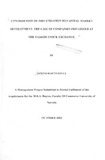| dc.description.abstract | In 1954, the Nairobi Stock Exchange (NSE) was constituted as a voluntary association of
stockbrokers registered under the Societies Act. The business of dealing in shares was then
confined to the resident European community, since Africans and Asians were not permitted to
trade in securities until after the attainment of independence. This marked an important milestone
in the effort toward the development of a functioning capital market for the mobilization and
allocation of long-term capital to the private sector. As at December 2002, 53 companies were
listed at the NSE, nine of which were privatized through initial public offer by the government.
The state of the capital markets will restrict both the pace of privatization, in terms of how many
enterprises could be put up for sale, and the methods available for broadening ownership. This
limitation has been of great concern to all governments, and a lot of effort is going into capital
market development alongside financial sector reforms. The scope and pace for further divesting
government-owned assets and shares in the large enterprises will depend on progress in capital
market development. A synergy exists between privatization and capital markets development,
because the sale of state assets provides a tremendous impetus to stock market activity. Quite
apart from freeing government resources for re-deployment to the poor, privatization has positive
overall welfare effects.
This study sought to find out if the government privatization program through public floatation
improved the pace of privatization, in terms of how many enterprises could be put up for sale.
The study also sought to establish if the Privatization Implementation Unit and Parastatal Reform
and Privatization Committee, should still pursue the objectives of the widening of participation
by the people in the ownership and management of these parastatals as well as developing the
local capital market, in their privatization programs and to what extent has the privatization
programme contributed to the Nairobi Stock Exchange capitalization and the quantity of share
Issues. | en |

